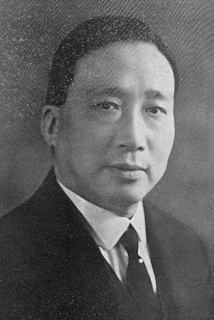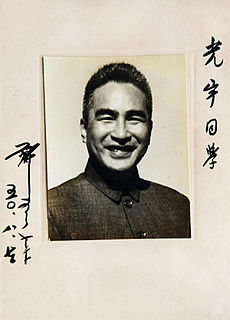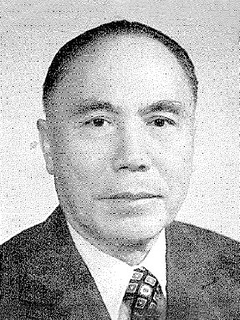The Pan-Purple Coalition or the Alliance of Fairness and Justice is a social activist umbrella group based in the Republic of China (Taiwan). The coalition brings together nine social welfare organizations and promotes the causes of the underprivileged. It supports progressive taxation, a national social welfare system, education reforms, and gender and ethnic equality.

The Civil Human Rights Front (CHRF) was an organisation that focused on the issues of Hong Kong politics and livelihood, affiliated with almost all pan-democratic camps in Hong Kong. It was founded on 13 September 2002 and disbanded on 15 August 2021.

Wang Lingji (王陵基) was a Kuomintang of China (KMT) general from Sichuan. In 1913, he fought against the Beiyang government and the Chinese Workers' and Peasants' Red Army. He commanded the 30th Army Group from April 1938 to October 1945. He fought against the Imperial Japanese Army in Hubei; Jiangxi and Hunan.

Jack C.K. Teng, was a Chinese educator, writer, politician, diplomat and Olympic pioneer. He is best known as the Chairman of the Chinese National Olympic Committee during the 1960 Summer Olympics, the first time a Chinese athlete won an Olympic medal.
The 5th National Congress of the Kuomintang was held from 12–23 November 1935 at Nanking, Republic of China.

The 10th National Congress of the Kuomintang was the tenth national congress of the Kuomintang, held between 29 March to 9 April, 1969 in Chung-Shan Building, Beitou District, Taipei, Taiwan.

Literary Day is observed annually on May 4 in Taiwan, in honor of the May Fourth Movement. It was first celebrated on this day in 1945, and its establishment was affected by the dispute over whether the Kuomintang or the Communist Party was the legitimate successor to the May Fourth Movement, disagreements about how to interpret the movement, and other cultural struggles.

He Chengjun was a Kuomintang politician and military officer of the Republic of China. He was born in Hubei. He was graduate of the Imperial Japanese Army Academy. As a member of the Tongmenghui, he took part in the Xinhai Revolution. He was briefly mayor of Beijing after its capture by the National Revolutionary Army during the Northern Expedition. In the Second Sino-Japanese War, he was governor of his home province and defended it against the advancing Imperial Japanese Army. After the defeat of the Kuomintang in the Chinese Civil War, he went to Hong Kong and in 1951 arrived in Taiwan. He died in Taipei at the age of 78.

Yuan Liang (1882–1953) was a Kuomintang politician of the Republic of China. He was born in Hangzhou, Zhejiang. He was the 21st mayor of Beijing.
Yu Guangyuan was a Chinese economist, philosopher, and a senior official of the People's Republic of China. Yu was recognized as one of the first proponents of the socialist market-oriented economic system in China and the theory of "the Primary Stage of Socialism". He was a close adviser and speech-writer to the Chinese leader Deng Xiaoping.

Zheng Yanfen was a Chinese-born politician affiliated with the Kuomintang. He worked with the League of Nations and supported the Nationalist government. After the government of the Republic of China moved to Taiwan, Zheng led the Overseas Chinese Affairs Commission, was the Minister of Justice, and served as Secretary-General to the President.

Xie Shouchang known by his courtesy name Xie Guansheng (謝冠生) was a Chinese jurist who served as Minister of Justice from 1937 to 1948. After the government of the Republic of China moved to Taiwan, Xie was President of the Judicial Yuan 1958 to 1971.
Dato Aw Cheng ChyeS.P.M.J., B.B.M., O.St.J was a Singaporean millionaire and son of the late Aw Boon Par. Aw Cheng Chye himself was the chairman of Haw Par Brothers (Private) Limited and Haw Par Brothers International Limited until his sudden death on 22 August 1971 in Santiago de Chile.
Gǔ (谷) is a Chinese surname. According to a 2013 study it was 158th-most common surname in China, shared by 990,000 people or 0.075% of the population, with the province having the most people with the surname being Henan. The literal meaning of the surname is "valley" or "gorge".

Ku Cheng-ting was a Chinese-born politician, also known by the courtesy name Ming-shu (銘樞).

Hung Lan-yu was a Chinese politician.

Yu Chun-hsien was a Taiwanese politician. He served as the President of the Control Yuan from 1973 to 1987.












